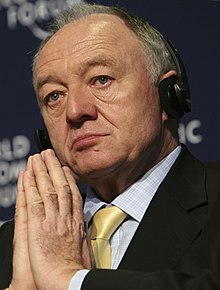Ken Livingstone
| Ken Livingstone | |
|---|---|
 |
|
| 1st Mayor of London | |
|
In office 4 May 2000 – 4 May 2008 |
|
| Deputy |
Nicky Gavron Jenny Jones Nicky Gavron |
| Preceded by | Position established |
| Succeeded by | Boris Johnson |
| Leader of the Greater London Council | |
|
In office 17 May 1981 – 1 April 1986 |
|
| Preceded by | Horace Cutler |
| Succeeded by | Position abolished |
|
Member of Parliament for Brent East |
|
|
In office 11 June 1987 – 7 June 2001 |
|
| Preceded by | Reg Freeson |
| Succeeded by | Paul Daisley |
| Majority | 23,748 (45.0%) |
| Personal details | |
| Born |
Kenneth Robert Livingstone 17 June 1945 London, England, UK |
| Political party |
Labour (Before 2000, 2003–present; Suspended 2016) Independent (2000–2003) |
| Spouse(s) | Christine Chapman (1973–1982) Emma Beal (2009–present) |
| Children | 5 |
| Alma mater | Philippa Fawcett Teacher Training College |
Kenneth Robert "Ken" Livingstone (born 17 June 1945) is an English politician who served as the Leader of the Greater London Council (GLC) from 1981 until the council was abolished in 1986, and as Mayor of London from the creation of the office in 2000 until 2008. He also served as the Member of Parliament (MP) for Brent East from 1987 to 2001. A suspended member of the Labour Party, he was on the party's hard left, ideologically identifying as a democratic socialist.
Born in Lambeth, South London, to a working-class family, Livingstone joined Labour in 1968 and was elected to represent Norwood at the GLC in 1973, Hackney North and Stoke Newington in 1977, and Paddington in 1981, when he was elected leader of the GLC by Labour members. Attempting to reduce London Underground fares, his plans were challenged in court and declared unlawful; more successful were his schemes to benefit women and underprivileged minorities, despite stiff opposition. Livingstone was heavily criticised in the mainstream media for supporting controversial issues like republicanism, LGBT rights, and a United Ireland, and given the moniker "Red Ken". Livingstone was a vocal opponent of the Conservative Party government of Prime Minister Margaret Thatcher, which in 1986 abolished the GLC. Elected as MP for Brent East in 1987, he became closely associated with anti-racist campaigns. He unsuccessfully stood for Labour Party leader on a leftist platform in 1992 and 1994, and became a vocal critic of Tony Blair's New Labour project that pushed the party to the centre.
...
Wikipedia
